Sing the Bay Fantastic
“We call it eelgrass music,” says Jeff Holland from his office on the campus of the Smithsonian Environmental Research Center in Edgewater. “Eelgrass seems an apt descriptor for the genre of ethno/eco-music we’re trying to create as part of the effort to build music into the legacy of the Bay.”
Holland works with the Arundel Rivers Federation as Riverkeeper for southern Anne Arundel waterways. An inveterate musician and poet when he’s not out rescuing ospreys or monitoring water quality, he’s spent most of his life writing and performing songs about the Bay, with an eye to engaging his audiences in the hard work of Bay restoration even as he gets them singing and clapping along.
“Music is such a common denominator among people from all walks of life, old or young,” he says, idly strumming his never-out-of-reach baritone ukulele.
Small wonder then, that Smithsonian Environmental Research Center director Tuck Hines pricked his ears when Holland proposed putting together a music festival that would draw Bay musicians who, like he, use Bay-centric music to communicate, educate and excite people about Bay issues.
As it happened, the Center was looking to host a musical event as part of the Smithsonian Year of Music initiative. Every day of 2019, the Smithsonian Institution planned to showcase a musical program on its main campus in Washington, D.C., or at one of its affiliate locations around the country.
Picking up on Holland’s concert idea, the Center proposed to participate by collaborating with the Arundel Rivers Federation to present the first-ever Chesapeake Music Festival. Under Holland’s leadership, Bay-centric musicians and storytellers from around the region perform on two stages overlooking the Rhode River.
Additional sponsors are the Four Rivers Heritage Area, Aveda, The Brick Companies, the Folklore Society of Greater Washington, Pirates Cove, R.W. Baird, Sweet Water Brewing Company, WRNR and Michael and Debbie Wagener.
“Music lives and breathes at the Smithsonian,” said David Skorton, then-secretary of the Smithsonian when the initiative was announced. “By highlighting our Institution-wide musical resources and people and by holding a daily musical event throughout the year, we will showcase music’s power to inspire, move and unite people across the world.”
Eelgrass music deftly plays into Skorton’s vision. Visionaries like the late Tom Wisner, regarded as the Bard of the Bay, saw music as a way for him and fellow biologists to communicate about the Bay’s vast watershed and the need for people to protect it. His song Chesapeake Born became an anthem for Bay conservation efforts and was featured in a National Geographic documentary, Chesapeake Borne (which also aired a lively rendition of Holland’s Back Creek Crab).
Teresa Whitaker and Frank Schwartz, who worked and recorded with Wisner, will bring his music to the festival stage. The pair, who now live in Connecticut, offer a compelling mix of Bay-inspired songs and spoken-word stories that focus on our interaction with the natural world. With Schwartz on guitar and Whitaker on percussion (and occasionally Irish harp), the two present songs that sparkle like the rivers they sing about.
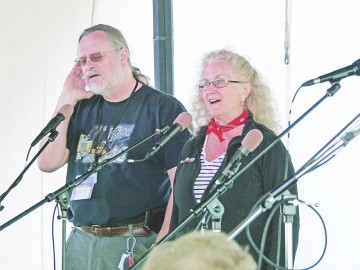
The dearth of traditional songs about the Bay was the catalyst for me, a songwriter as well, to search for authentic Chesapeake music to balance out my repertoire of classic New England sea chanteys. Finding very little, I set about to fill the void. Tomorrow’s Traditions Today, I call my homespun repertoire. Born and raised in Annapolis, I bring my nautical perspective of folk music and storytelling and introducing audiences to the region’s characters and traditions. My partner, Rob van Sante, a powerful singer and instrumentalist, lends his knack for melodies and flair for harmony to my compositions.
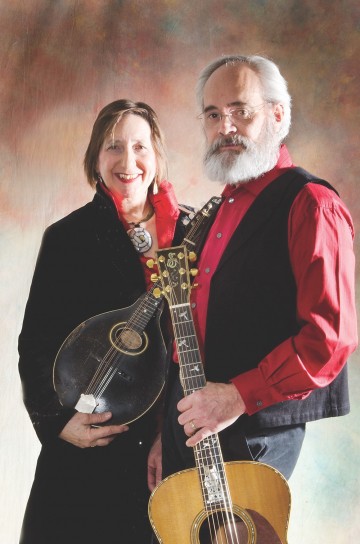
Performing as Magpie, another duo — Terry Leonino and Greg Artzner — have dedicated more than 40 years to spreading environmental activism and social justice. They use music to underscore their convictions that the Earth belongs to us all and that human rights and dignity are invariably tied up with our relationship to the land and sea. Recognized and recruited by the Smithsonian for other projects over the years, Magpie’s music helps illustrate the museum’s message about vanishing resources, an effort that stretches from the Chesapeake Bay to the Amazon River. Magpie looks just as hard at the human ecology of the region, offering songs that highlight the stories of Harriet Tubman and others who have used the Bay as a freedom highway. Lively, fun and provocative, Magpie’s performances are as compelling as they are entertaining.
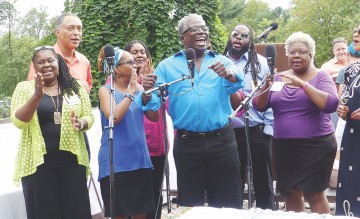
Highlighting African-American influences on music that derives from Bay fisheries, Jubilee Voices, an a cappella choral group directed by Andrea Jones Blackford under the umbrella of the Washington Revels, sings songs, menhaden-hauling chanteys and spirituals.
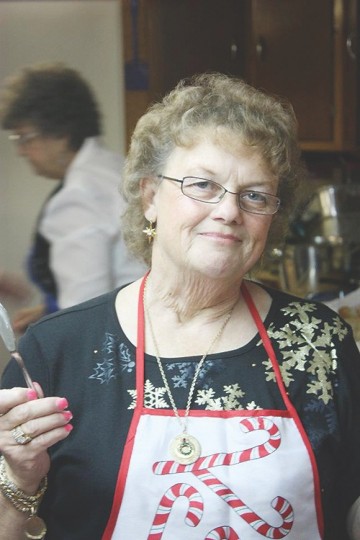
Performing on the storytelling stage is Janice Marshall, a sixth-generation Smith Islander. Her life as a waterman’s daughter, wife and mother comes front and center when she regales audiences with her spoken-word tales about the goings-on in one of the most remote harbors of the Bay. Marshall is deeply connected to the traditional lifeways of her island home, including the secrets to baking the celebrated Smith Island cake. Her poetry is as humorous as it is reflective of a rapidly disappearing way of life.
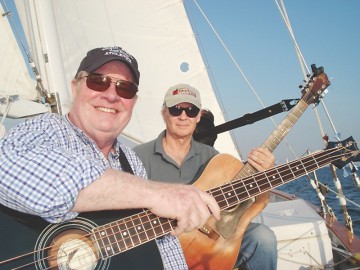
Don Shappelle hails from the Susquehanna River and northern Bay. His homespun songs are evocative of his mentor, Pete Seeger. They’re easy to sing along with, and the thoughtful lyrics always pack a punch. Heard locally aboard the schooner Woodwind out of Annapolis, Shappelle laces his songs with the beauty and magic of the Bay shore, especially his beloved Susquehanna River. He shines a poet’s light on the Bay, crafting a repertoire replete with summer memories floating on the Susquehanna and beyond. Don Sennett joins on bass and vocals.
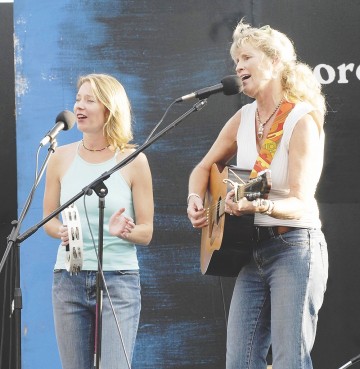
The festival introduces Thelma Peterson, a singer/songwriter from Machipongo on Virginia’s Eastern Shore. Her deeply reflective songs highlight her surroundings and recount some of her own family history, which stretches back three centuries and is full of boat builders, watermen and seafood traders from both sides of the Bay. Her daughter Erika Peterson joins her.
Holland and That West River Band offer a rousing close to the day with upbeat renditions of some of the songs Holland has scribed over the years, like Back Creek Crab or his Sub-Aquatic Vegetation sing-along tango. Co-founder of the Bay-inspired groups Crab Alley (now defunct) and Them Eastport Oyster Boys, Holland has long held title as Eastport’s Poet Laureate. He uses music as a tool for inspiring his listeners — countless school children among them — to become better stewards of the Bay. That West River Band is composed of Todd Moffatt on vocals, blues harp and percussion; Don Cosdon on guitar and vocals; Peter Bell on bass guitar; and Joe Evans on mandolin and slide guitar.
This is a zero-waste event. The Smithsonian offers composting and recycling and encourages you to bring your own water bottles for free water refills. Food, beer and soft drinks sold (cash). Only service animals allowed.
September 14, 2-6pm, Smithsonian Environmental Research Center, 647 Contees Wharf Rd., Edgewater. Parking is limited; advance tickets ($20 per car online) recommended. Drop-in tickets ($30 per carload, cash only) at the gate while space remains: https://whatsuptix.com/events/Chesapeake-Music-Festival-9-14-2019.
